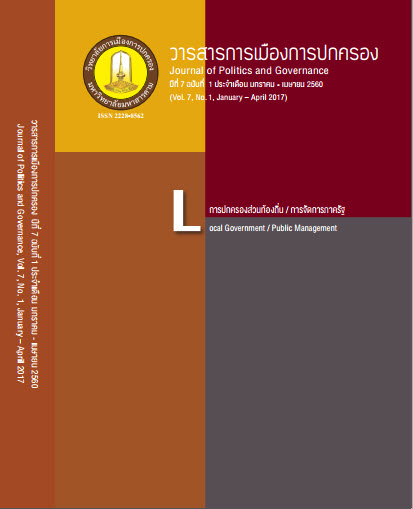Late Submission of Undergraduate Student’s Grading Form : A Case Study of the College of Politics and Governance, Mahasarakham University
Main Article Content
Abstract
This research paper aimed to 1) explore the factors of the late submission of undergraduate student’s grading form at the College of Politics and Governance, Mahasarakham University; and 2) look for the proper solution to prevent the late grading submission. This qualitative research used the in-depth interview to collect the data from the population that was a group of 28 full-time lecturers at the College of Politics and Governance. The research outcome highlights 2 main factors including: 1) the Lecturer’s Personal Characters: 1.1 Lack of Self-discipline; 1.2) Irresponsible Work Behavior; 1.3) Disobedience to the university’s schedule and orders; 1.4) Health problem; 1.5) Overloaded Work e.g. teaching, management, academic service, researching, and self-improvement plan; and 1.6) Lack of Proficiency and Skill in Educational Assessment and Systematic Classroom Management; and 2) Subject of Teaching: 2.1) Excessive Number of Student per Class; 2.2) the Subject’s Unclear Objective; 2.3) Problem with Teaching and Grading in Classroom; and 2.4) Problem with Essay Test. Several solutions were given including 1) the Work Achievement Decoding or Knowledge Management Workshop should be organized for the lecturers to exchange their ideas and teaching tactics; 2) the Lecturer’s Feedback needs to be carefully listened in order to design any workshop to empower their performance e.g. teaching techniques, teaching plan making, learning achievement assessment and evaluation; 3) An orientation should be organized for the new lecturers to prepare them with knowledge and skill for the classroom management and learning assessment; 4) Number of subject with late grading submission should be reduced in each semester; and 5) Serious punishment needs to be firmly set for the lecturer with late grading submission, especially those with negative effect on the student e.g. student’s retirement or late graduation, etc.In conclusion, the key solution to prevent the late grading submission is that the lecturers should be a goal-oriented person with patience, work effort, responsibility, and agree to follow the rules. Besides, they should be confident and well-trained with academic or learning assessment skills. Another notable solution is that the new lecturer’s orientation or workshop to improve their knowledge and skill for the classroom management and learning assessment, as well as an understanding toward their roles and responsibility as a lecturer. After all, these activities will gradually become an organizational culture within the lecturer’s community and implant them with a good sense of working responsibility from the beginning of their work. Meanwhile, the lectures whose action goes against the professional ethics will surely deserve a certain kind of punishment so that the others will not follow his path. Finally, a good organizational culture will be firmly set.
Article Details

This work is licensed under a Creative Commons Attribution-NonCommercial-NoDerivatives 4.0 International License.
References
กระทรวงศึกษาธิการ. (2548). พระราชบัญญัติระเบียบข้าราชการครูและบุคลากรทางการศึกษา พุทธศักราช 2547. กรุงเทพฯ: กระทรวงศึกษาธิการ.
จริยา เสถบุตร. (2522). การวัดและประเมินผลทางการศึกษา. ขอนแก่น: มหาวิทยาลัยขอนแก่น.
จิตนา ยูนิพนธ์. (2527). การเรียนการสอนทางพยาบาลศาสตร์. กรุงเทพฯ: จุฬาลงกรณ์มหาวิทยาลัย.
เจริญ ไวรวัจนกุล. (2531). ความเป็นครู. สุรินทร์: สหวิทยาลัยอีสานใต้ วิทยาลัยครูสุรินทร์.
ชาญชัย อินทรประวัติ. (2553). วิธีสอนทั่วไปและการสอนแบบจุลภาค. สงขลา: มหาวิทยาลัยศรีนครินทร์วิโรฒ สงขลา.
ทรรศนียา กัลยาณมิตร. (2525). แบบจำลองศูนย์บริการสื่อการศึกษาของสถาบันฝึกหัดครู. กรุงเทพฯ: คณะครุศาสตร์ จุฬาลงกรณ์มหาวิทยาลัย.
ทองเรียน อมัชกุล. (2525). การบริหารกิจการนิสิต ทฤษฎีและแนวปฏิบัติ. กรุงเทพฯ: กรมการฝึกหัดครู.
ทัศนีย์ ศุภเมธี. (2533). การศึกษาผลสัมฤทธิ์ทางการฝึอบรมวิธีการสอนภาษาไทยและประสิทธิภาพทางการฝึกสอนของนักศึกษาโปรแกรมวิชาเอกภาษาไทย วิทยาลัยครูธนบุรี. ธนบุรี :
วิทยาลัยครูธนบุรี สหวิทยาลัยรัตนโกสินทร์.
ธีระ นทีวุฒิกุล. (2521). การศึกษาความต้องการเข้าร่วมกิจกรรมนิสิตของจุฬาลงกรณ์มหาวิทยาลัย. ปริญญานิพนธ์ กศ.ม. กรุงเทพฯ: มหาวิทยาลัยศรีนครินทรวิโรฒ ประสานมิตร.
บุญชม ศรีสะอาด. (2555). วินัยในตนเองและงานวิจัยที่เกี่ยวข้อง. วารสารการวัดผลการศึกษา, 17 (1) : 3-15 : กรกฎาคม 2555.
ปัญญา สมบูรณ์ศิลป์. (2523). หลักการจัดสุขภาพโรงเรียน. กรุงเทพฯ: อักษรเจริญทัศน์.
พรชุลี คุณานุกร. (2523). สู่การอุดมศึกษา. กรุงเทพฯ: จุฬาลงกรณ์มหาวิทยาลัย.
พรชุลี อาชวอำรุง. (2525). นิสิต นักศึกษา: หลักการ แนวปฏิบัติและปัญหา. กรุงเทพฯ :โอเดียนสโตร์.
พรรณี ชูทัย. (2522). จิตวิทยาการเรียนการสอน. กรุงเทพฯ : วรวุฒิการพิมพ์.
พันทิพา อุทัยสุข. (2525). ปัจจัยเสริมการเรียนการสอน: ชุดวิชาพื้นฐานการศึกษา. กรุงเทพฯ : มหาวิทยาลัยสุโขทัยธรรมาธิราช.
พิตร ทองชั้น. (2524). หลักการวัดผล. กรุงเทพฯ : มหาวิทยาลัยศรีนครินทรวิโรฒ ประสานมิตร.
ไพฑูรย์ สินลารัตน์. (2522). หลักและวิธีการสอนระดับอุดมศึกษา. กรุงเทพฯ: จุฬาลงกรณ์มหาวิทยาลัย.
รมดี พิมลบรรยงก์. (2528). ปัญหาการจัดวิชาพื้นฐานการศึกษาตามหลักสูตรของสภาการฝึกหัดครู. วิทยานิพนธ์ ค.ม. กรุงเทพฯ: จุฬาลงกรณ์มหาวิทยาลัย.
วารี ถิระจิตร. (2525). แบบจำลองศูนย์บริการสื่อการศึกษาของสถาบันฝึกหัดครู. กรุงเทพฯ : จุฬาลงกรณ์มหาวิทยาลัย.
วิไลเฉิด ทวีสิน. (2522). มนุษย์กับสิ่งแวดล้อม (ส 021). กรุงเทพฯ: อักษรเจริญทัศน์.
สถาบันราชภัฏสุราษฎร์ธานี. (2540). คู่มือการศึกษา. สุราษฎร์ธานี: สถาบันราชภัฏสุราษฎร์ธานี.
สมเกียรติ ศรีเมือง. (2545). ความพึงพอใจในการปฏิบัติงานของครูโรงเรียนประถมศึกษาสังกัดสำนักงานการประถมศึกษาจังหวัดสุพรรณบุรี. ปริญญา กษ.ม. กรุงเทพฯ: มหาวิทยาลัย
เกษตรศาสตร์.
สุณีย์ ธีดากร. (2522). จิตวิทยาการศึกษา. กรุงเทพฯ: วิทยาลัยครูพระนคร.
สุพิน บุญชูวงศ์. (2539). หลักการสอน. กรุงเทพฯ: สถาบันราชภัฏสวนดุสิต.
สุมิตร คุณานุกร. (2518). หลักสูตรและการสอน. กรุงเทพฯ: ชวนพิมพ์.
อรวรรณ พาณิชปฐมพงศ์. (2542). ความสัมพันธ์ระหว่างปัจจัยบางประการกับพฤติกรรมด้านความมีวินัยของตนเองของนักเรียนชั้นประถมศึกษาปีที่ 6. ปริญญานิพนธ์ กศ.ม. กรุงเทพฯ :
มหาวิทยาลัยศรีนครินทรวิโรฒ ประสานมิตร.
อารมณ์ วุฒิพฤกษ์. (2525). ประเมินผลสัมฤทธิ์การศึกษาภาคปฏิบัติการพยาบาลอนามัยชุมชนของนักศึกษาคณะพยาบาลศาสตร์มหาวิทยาลัยมหิดล. กรุงเทพฯ : มหาวิทยาลัยมหิดล.
อุทุมพร ทองอุไทย. (2523). ลักษณะของอาจารย์มหาวิทยาลัยในอุดมคติ. การวิจัยการศึกษา. ม.ป.ป.
Edward F. Sheffield, ed. (1974). Teaching in the Universities No One Way. Montreal: McGill Queen’s.
Gagne, R.M. (1967). Curriculum: Comprehensives Instruction. Boston : Little Brow and Company.
Reese Danley Kilgo. (1970). What the Good Teacher Does, Improving College and University Teaching.
Steve DeVore. Self-discipline. < http://www.sybervision.com/Discipline/index.htm#contents>10 เมษายน 2555.
T.M. Newcomp. (1954). Social Psychology. New York : Dryden Press


